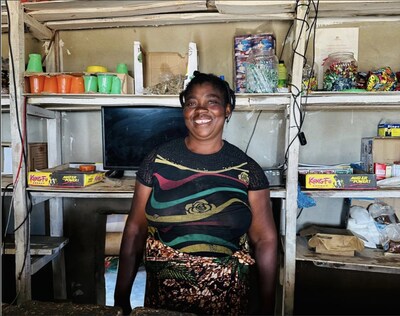Studies Confirm Bicycles Deliver 14x ROI and Build Climate Resilience Across Rural Africa
World Bicycle Relief and IDinsight present new cost-effectiveness analysis at Bicycle Mobility and Impact Forum in Lusaka, validating earlier RCT findings
LUSAKA, Zambia, Sept. 16, 2025 /PRNewswire/ -- World Bicycle Relief (WBR), in partnership with global research organization IDinsight, today announced new cost-effectiveness findings showing that bicycles deliver a 14.7-to-1 return on investment (ROI), underscoring their value as one of the most effective and impactful sustainable development interventions. Presented at WBR's Bicycle Mobility and Impact Forum in Lusaka, the analysis builds on two landmark randomized controlled trials (RCTs) in Zambia, confirming that bicycles not only generate exceptional economic and social returns but also enable households to sustain and grow their livelihoods through times of crisis. The RCT evidence highlights the multidimensional benefits of bicycles—advancing education, strengthening healthcare access, and improving household resilience—particularly for women.
During Zambia's 2024 drought, households with bicycles were less food insecure, maintained incomes, and preserved key assets such as livestock, while control households experienced declines and sold off productive assets. Bicycle recipients spent more time on farms, reached farther markets, maintained more nutritious diets, and continued to access essential services such as water, schools, and healthcare. Bicycle owners gained approximately one hour per day for productive activities.
The 2024 RCT, sampling households in Mumbwa District, Zambia, established clear gains in income, productivity, and access to essential services. Findings from WBR's 2018 RCT in the Southern Province generated evidence on the impact of bicycles on attendance, punctuality, and empowerment. Now, the cost-effectiveness analysis provides fresh evidence of the return on investment of bicycles in the sectors of health, education, and economic opportunity.
- Exceptional ROI: Bicycles deliver a 14.7x return on investment (ROI) of the cost of the bicycle. Households receiving bicycles generated an average of $3,188 in economic benefits over five years—driving higher consumption, greater savings, and fewer debts.
- Education Impact: Providing bicycles to girls in primary schools increases school attendance by 17 days each year, per $100 invested.
- Healthcare Reach: Providing bicycles to community-based volunteers through the Mobilized Communities program enables CHWs to serve 5,774 additional clients over five years per bicycle distributed.
"These findings confirm that bicycles are not only transformative for rural livelihoods, but also among the most cost-effective development interventions we've studied," said Kashif Ahmed, Junior Economist at IDinsight. "A nearly 15-to-1 return on investment places bicycles alongside the most impactful anti-poverty programs, delivering lasting social and economic benefits at a fraction of the cost. For policymakers and funders seeking scalable, evidence-based approaches, bicycles represent a proven, high-value solution."
Beatrice's Story: Doubling Income, Strengthening Community
In Chipa Village, Mumbwa District, Headwoman Beatrice can testify firsthand how a Buffalo Bicycle transforms both leadership and livelihood. Previously, she spent about $6 each week on transport just to cover the 20 kilometers required to attend meetings at the palace. With her new bicycle, those journeys cost nothing—and the savings have fueled growth in her small grocery store and tomato garden. In just one year, her household income has doubled from $175 to $350 per month, a 50% increase, by using the bicycle to transport fresh produce to market and restock her shop. Beyond her own success, the bicycle has become a lifeline for her community: family and neighbors borrow it to reach the health center when unwell, extending the impact far beyond one household. Beatrice's story captures how bicycles reduce barriers, unlock opportunity, and strengthen resilience across entire communities.
Cross-Country Validation
Beyond Zambia, monitoring data from Malawi, Kenya, Zimbabwe, and Colombia showed similar or even greater income gains, confirming that World Bicycle Relief's Mobilized Communities model is relevant across geographies and cultures. This growing body of evidence underscores that the economic and resilience benefits of bicycles are not unique to one setting, but consistently replicated around the world.
"Resilience is about more than surviving a drought — it's about sustaining livelihoods, protecting families' assets, and enabling communities to thrive in the long term," said Sean Granville-Ross, Executive Director of Programs at World Bicycle Relief. "These findings prove that bicycles are a powerful, climate-friendly tool for resilience in rural communities."
20th Anniversary Milestone
This report comes as WBR marks its 20th anniversary as a global nonprofit organization. With WBR having operated in Zambia for 19 years—its first program country in Africa—the research underscores the enduring power of bicycles to transform access to healthcare, education, and economic opportunities in underserved regions.
Global Implications
With the development sector under pressure to deliver greater impact per dollar, the evidence positions bicycles among the most cost-effective mobility solutions. Few interventions deliver such strong returns across multiple sectors—income generation, education, healthcare, and climate resilience—while being simple, scalable, and environmentally friendly. WBR is calling on governments, policymakers, and donors to integrate bicycle mobility solutions to accelerate and amplify their development strategies and climate adaptation plans, ensuring millions more can benefit from this proven solution.
"Eighteen years after launching our programs in Zambia, the evidence is clear: the bicycle is one of the best investments in sustainable development," said Dave Neiswander, CEO of World Bicycle Relief. "Now it's time to scale this solution so millions more can ride their way to opportunity and resilience—gaining the means to grow their incomes, keep children in school, protect vital assets, and secure their futures in the face of climate change."
About World Bicycle Relief:
Founded in 2005, World Bicycle Relief mobilizes people through the Power of Bicycles. As a pioneering non-profit social enterprise, World Bicycle Relief has distributed over 900,000 bicycles and trained over 3,350 mechanics to provide greater access to education, healthcare, and economic opportunities, uplifting communities worldwide. Discover more about our mission, impact, and vision at WorldBicycleRelief.org.
About IDinsight
IDinsight is a mission-driven global advisory, data analytics, and research organization that helps global development leaders maximize their social impact. We tailor a wide range of data and evidence tools, including randomized evaluations and machine learning, to help decision-makers design effective programs and rigorously test what works to support communities. We work with governments, multilateral agencies, foundations, and innovative non-profit organizations in Asia and Africa. We work across a wide range of sectors, including agriculture, education, health, governance, sanitation, and financial inclusion. We have team members who are remote and have offices in Dakar, Lusaka, Manila, Nairobi, New Delhi, and Rabat.
![]() View original content to download multimedia:https://www.prnewswire.com/news-releases/studies-confirm-bicycles-deliver-14x-roi-and-build-climate-resilience-across-rural-africa-302557424.html
View original content to download multimedia:https://www.prnewswire.com/news-releases/studies-confirm-bicycles-deliver-14x-roi-and-build-climate-resilience-across-rural-africa-302557424.html
SOURCE World Bicycle Relief



